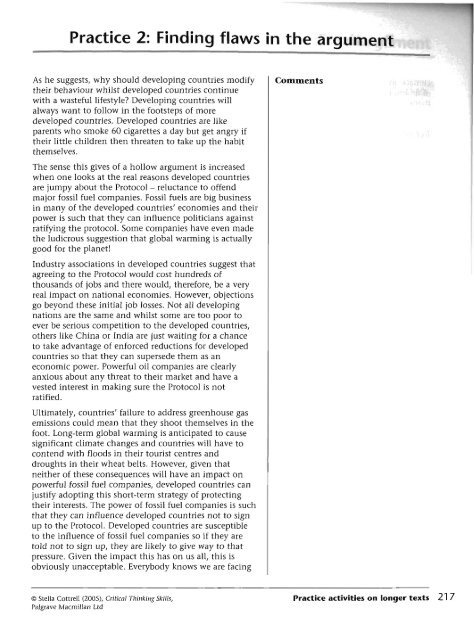Critical Thinking Skills - Developing Effective Analysis and Argument(2)
Critical Thinking Skills - Developing Effective Analysis and Argument(2)
Critical Thinking Skills - Developing Effective Analysis and Argument(2)
Create successful ePaper yourself
Turn your PDF publications into a flip-book with our unique Google optimized e-Paper software.
Practice 2: Finding flaws in the argument<br />
As he suggests, why should developing countries modify<br />
their behaviour whilst developed countries continue<br />
with a wasteful lifestyle <strong>Developing</strong> countries will<br />
always want to follow in the footsteps of more<br />
developed countries. Developed countries are like<br />
parents who smoke 60 cigarettes a day but get angry if<br />
their little children then threaten to take up the habit<br />
themselves.<br />
The sense this gives of a hollow argument is increased<br />
when one looks at the real reasons developed countries<br />
are jumpy about the Protocol - reluctance to offend<br />
major fossil fuel companies. Fossil fuels are big business<br />
in many of the developed countries' economies <strong>and</strong> their<br />
power is such that they can influence politicians against<br />
ratifying the protocol. Some companies have even made<br />
the ludicrous suggestion that global warming is actually<br />
good for the planet!<br />
Industry associations in developed countries suggest that<br />
agreeing to the Protocol would cost hundreds of<br />
thous<strong>and</strong>s of jobs <strong>and</strong> there would, therefore, be a very<br />
real impact on national economies. However, objections<br />
go beyond these initial job losses. Not all developing<br />
nations are the same <strong>and</strong> whilst some are too poor to<br />
ever be serious competition to the developed countries,<br />
others like China or India are just waiting for a chance<br />
to take advantage of enforced reductions for developed<br />
countries so that they can supersede them as an<br />
economic power. Powerful oil companies are clearly<br />
anxious about any threat to their market <strong>and</strong> have a<br />
vested interest in making sure the Protocol is not<br />
ratified.<br />
Ultimately, countries' failure to address greenhouse gas<br />
emissions could mean that they shoot themselves in the<br />
foot. Long-term global warming is anticipated to cause<br />
significant climate changes <strong>and</strong> countries will have to<br />
contend with floods in their tourist centres <strong>and</strong><br />
droughts in their wheat belts. However, given that<br />
neither of these consequences will have an impact on<br />
powerful fossil fuel companies, developed countries can<br />
justify adopting this short-term strategy of protecting<br />
their interests. The power of fossil fuel companies is such<br />
that they can influence developed countries not to sign<br />
up to the Protocol. Developed countries are susceptible<br />
to the influence of fossil fuel companies so if they are<br />
told not to sign up, they are likely to give way to that<br />
pressure. Given the impact this has on us all, this is<br />
obviously unacceptable. Everybody knows we are facing<br />
Comments<br />
O Stella Cottrell (2005), <strong>Critical</strong> Tl~inking <strong>Skills</strong>,<br />
Palgrave Macmlllan Ltd<br />
Practice activities on longer texts 21 7



